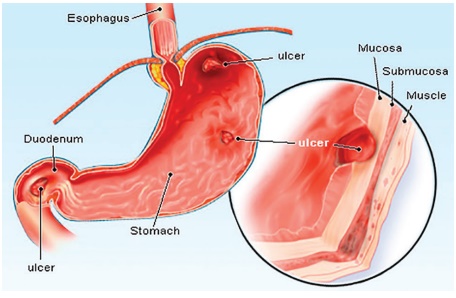Gastric ulcers, also known as stomach ulcers, are a common gastrointestinal condition that affects millions of people worldwide. These painful sores form in the lining of the stomach and can cause a range of symptoms, including abdominal pain, bloating, nausea, and vomiting. In this blog, we will delve into what gastric ulcers are, what causes them, and how they can be treated.

What are Gastric Ulcers?
ulcers are open sores that develop in the lining of the stomach. They can range in size from a few millimetres to several centimetres and can be shallow or deep. These ulcers can occur in any part of the stomach but are most commonly found in the upper part of the stomach, known as the antrum.
What Causes Gastric Ulcers?
The primary cause of gastric ulcers is the bacterium Helicobacter pylori (H. pylori). This bacterium is found in the stomach of almost half of the world’s population, but not everyone with H. pylori will develop ulcers. Other factors that can contribute to the development of ulcers include:
- NSAIDs: Nonsteroidal anti-inflammatory drugs (NSAIDs) such as aspirin, ibuprofen, and naproxen can cause damage to the stomach lining, leading to the formation of ulcers.
- Alcohol: Excessive alcohol consumption can irritate the stomach lining, leading to the development of ulcers.
- Smoking: Smoking can increase the production of stomach acid and decrease the production of protective mucus, leading to the development of ulcers.
- Stress: While stress doesn’t directly cause ulcers, it can increase the production of stomach acid, which can exacerbate the symptoms of existing ulcers.
- Genetics: Some people are more susceptible to developing gastric ulcers due to their genetics.
Symptoms of Gastric Ulcers
The symptoms of gastric ulcers can vary from person to person, but common symptoms include:
- Abdominal pain: This is the most common symptom of gastric ulcers. The pain is usually described as a dull, burning, or gnawing sensation in the upper abdomen.
- Bloating: Many people with gastric ulcers experience bloating or a feeling of fullness in the stomach.
- Nausea and vomiting: Some people with ulcers may experience nausea and vomiting, especially after eating.
- Loss of appetite: ulcers can cause a loss of appetite, which can lead to unintended weight loss.
- Dark, tarry stools: Gastric ulcers can cause bleeding in the stomach, which can result in dark, tarry stools.
Treatment for Gastric Ulcers
The treatment for gastric ulcers depends on the underlying cause of the ulcer. In most cases, treatment will involve a combination of medication and lifestyle changes. Here are some common treatment options for gastric ulcers:
- Proton pump inhibitors (PPIs): PPIs are a class of medication that reduce the amount of acid produced by the stomach. They are often prescribed to treat gastric ulcers caused by H. pylori infection.
- Antibiotics: If the ulcer is caused by an H. pylori infection, antibiotics may be prescribed to kill the bacteria.
- H2 blockers: H2 blockers are a class of medication that reduce the amount of acid produced by the stomach. They are often used in combination with PPIs to treat ulcers.
- Antacids: Antacids are a class of medication that neutralize stomach acid. They can provide relief from the symptoms of ulcers.
- Lifestyle changes: Making lifestyle changes such as quitting smoking, reducing alcohol consumption, and eating a healthy diet can help reduce the risk of developing gastric ulcers and can also aid in the healing process.
- Surgery: In rare cases, surgery may be necessary to treat ulcers. This is usually only considered if the ulcer is causing significant bleeding or is not responding to other forms of treatment.
Prevention of Gastric Ulcers
Preventing ulcers involves taking steps to reduce the risk factors that contribute to their development. Some ways to prevent ulcers include:
- Quitting smoking: Smoking can increase the production of stomach acid and decrease the production of protective mucus, which can lead to the development of ulcers. Quitting smoking can reduce the risk of developing ulcers.
- Reducing alcohol consumption: Excessive alcohol consumption can irritate the stomach lining, leading to the development of ulcers. Reducing alcohol consumption can reduce the risk of developing ulcers.
- Avoiding NSAIDs: NSAIDs such as aspirin, ibuprofen, and naproxen can cause damage to the stomach lining, leading to the development of ulcers. Avoiding these medications can reduce the risk of developing ulcers.
- Eating a healthy diet: Eating a diet that is high in fiber and low in fat can help reduce the risk of developing ulcers.
- Managing stress: While stress doesn’t directly cause ulcers, it can increase the production of stomach acid, which can exacerbate the symptoms of existing ulcers. Managing stress through techniques such as exercise, meditation, or therapy can help reduce the risk of developing ulcers.
In conclusion, gastric ulcers are a common gastrointestinal condition that can cause a range of symptoms, including abdominal pain, bloating, nausea, and vomiting. They are most commonly caused by the bacterium H. pylori, but can also be caused by factors such as NSAIDs, alcohol, smoking, and stress. Treatment for ulcers typically involves a combination of medication and lifestyle changes. Preventing ulcers involves taking steps to reduce the risk factors that contribute to their development, such as quitting smoking, reducing alcohol consumption, and avoiding NSAIDs. If you are experiencing symptoms of ulcers, it is important to consult with your healthcare provider for proper diagnosis and treatment.










